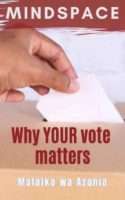A month ago, my 18-year-old younger brother, Lumumba, told me that he would not be registering to vote in the upcoming local government elections. I was devastated. I spent days trying to reason with him. It took a lot of explaining, some pleading and a degree of emotional blackmail to get him to use the online portal to register. And he did so just in the nick of time – on the last day of the final registration weekend. A week ago, I reminded him that elections are taking place on the 1st of November and I could sense from his tone that he has very little interest in them. I have determined that next Monday after casting my vote, I am going straight to Soweto, where he lives with my grandmother, to drive him to his voting station so that he may cast his vote. I am afraid that if I do not do this, he might not vote. He would be joining millions of young people in our country who are eligible to vote but will not be doing so. Many of them did not even register.
I had a discussion with Lumumba about why he was uninterested in casting his vote and his response was that voting does not make much of a difference; that the conditions of Black people in particular have remained the same since long before he was born. It is a sentiment shared by millions of South Africans, particularly those who were born in the democratic dispensation. It is a cruel irony that this generation of people who were born post-apartheid are the biggest critics of democracy. But it is a feeling I understand all too well, and one that I expressed in both my books, the bestselling Memoirs of a Born Free: Reflections on the Rainbow Nation and the recently published Corridors of Death: The Struggle to Exist in Historically White Institutions. I too am a child of democracy and I too am growing increasingly disillusioned with a country where 64.4 percent of the youth are unemployed, where nearly half the population lives below the poverty line and where maladministration and rampant corruption are the order of the day.
But my disillusionment with these challenges is nothing compared to the love that I have for my country and I know that one of the ways of demonstrating this love is by being an active participant in the shaping of its future. The idea that votes do not make a difference is not only patently false but is also very dangerous because it renders people hopeless. When people do not believe that they can effect any meaningful change, they cease to invest themselves in building a functional and harmonious society. It is the beginning of a descent into chaos because those who do wrong things in the state become emboldened in their wrong-doing, confident that they will never be held accountable. This breeds ethical nightmares of unparalleled proportions.
I don’t want young people to ever think their votes don’t matter. Our ability to self-determine is a product of colossal sacrifices that were made by those who came before us. Millions of people across the racial, class and gender divide, suffered and made the ultimate sacrifice for us to be able to have this vote, and thereby to determine the fate of our country. But more than this, votes do make a difference. Votes decide who governs and that determines what policies are put in place. But participatory democracy doesn’t end with votes, it starts with them. After elections, we must still participate in processes within our municipalities, including being involved in community meetings when the Integrated Development Plan (IDP) is done. The IDP is based on community needs, which are defined by the people. It is the people, not politicians or government officials, who decide what are priorities in a municipal budget.
Young people in our country need to take back their power. Many might feel voiceless, but as Indian writer and activist Arudhati Roy so profoundly puts it: “There’s really no such thing as the “voiceless”. There are only the deliberately silenced, or the preferably unheard”. And it is up to us to raise our voices so loudly that it becomes impossible to silence us or to unhear what we say. It starts with placing that X on a ballot paper. That is how we begin to take back our power.
*Malaika is an award-winning, bestselling author. She recently completed a Master of Public Affairs in Food Security and is currently pursuing a Master of Science in Urban and Regional Planning at the University of Johannesburg.
***
Read more about how we have all adjusted to the new normal here.
Tell us: What do you think of this piece? Do you agree with the author?


